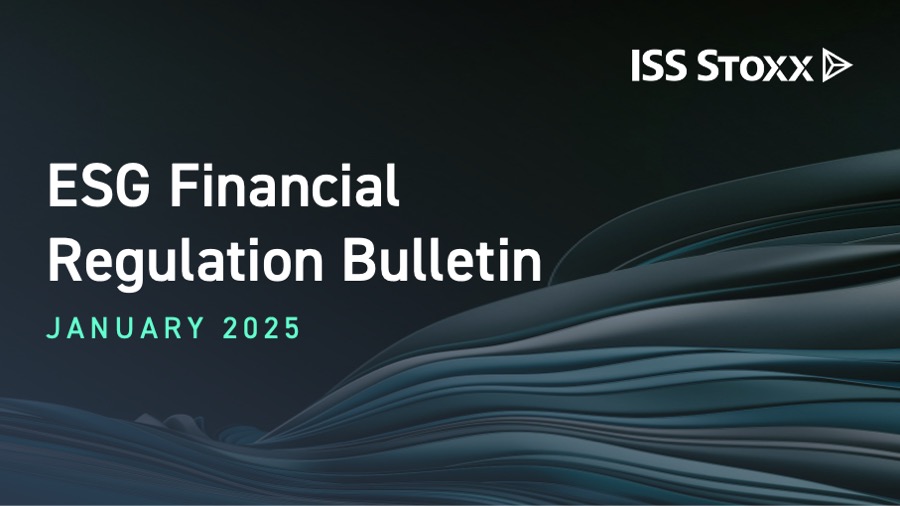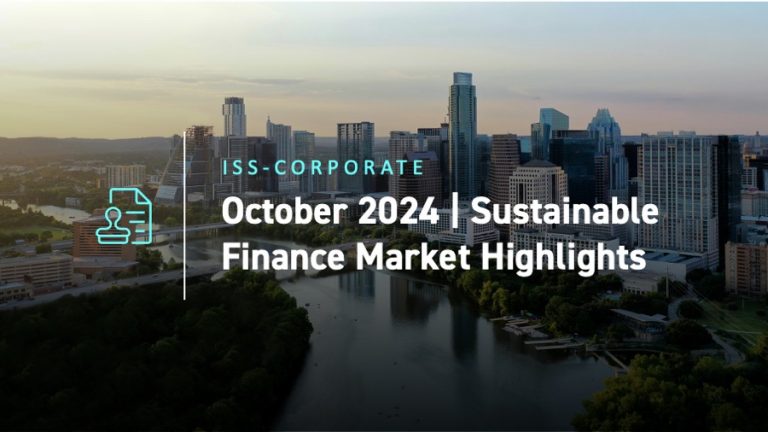
IOSCO
International Organization of Securities Commissions Unveils Dedicated Network to Encourage Adoption of IFRS Sustainability Disclosure Standards
The International Organization of Securities Commissions (IOSCO) Growth and Emerging Markets (GEMC) committee announced on December 18 the creation of the GEMC Network for Adoption or Other Use of ISSB Standards to support the adoption of corporate sustainability disclosure standards. Members of the network, representing 31 jurisdictions, will promote the adoption of the International Financial Reporting Standards (IFRS) Foundation’s Sustainability Disclosure Standards in the 31 jurisdictions they collectively represent. Members commit to either developing or implementing a roadmap for the jurisdictional adoption of IFRS-aligned Sustainability Disclosure Standards or engaging in market readiness assessments and capacity building on the supervisory aspects of, and the Jurisdictional Guide to, the IFRS Standards.
GRI
Global Reporting Initiative Launches New Pollution Working Group
The Global Reporting Initiative (GRI) launched a new working group on December 16, which is tasked with developing new “Topic Standards” on pollution-related disclosures. The Pollution Working Group comprises corporate experts from a range of industries; civil society experts; labor organization representatives; investors; and mediators from consulting, reporting, regulatory, and policymaking backgrounds. The working group is tasked with reviewing and enhancing existing GRI Standards and creating “new disclosures to report on pollution-related topics.” Draft “Topic Standards” on pollution-related disclosures are expected by early 2026.
UN
United Nations Publishes Paper Advocating for International Sustainability Reporting Based on the GRI and ISSB Standards
In preparation for the United Nations Fourth International Conference on Financing for Development (FfD4) scheduled for June/July 2025, UN Member States published the “Elements Paper” on December 5. The Elements Paper outlines agenda items and negotiating stances for the FfD4, including member states’ positions on “aligning private business and finance with the [UN Sustainable Development Goals].” With respect to sustainable finance, the Elements Paper encourages the promotion of “interoperable sustainable business and finance legislation” based on a double materiality approach and requiring disclosures “on both sustainability-related financial risks and environmental/social impacts.” The Elements Paper proposes achieving this aim through country-led and context-specific legislation that transposes “standards of the International Sustainability Standards Board [ISSB] and Global Reporting Initiative [GRI] in parallel,” including developing external audit standards; establishing a “global interoperability governance framework”; adopting an “SDG finance taxonomy”; and proposing new legislation on “sustainability management, investor stewardship, and due diligence.” GRI and ISSB are engaging with FfD4 to support the aims of the Elements Paper.
SBTi
Science Based Targets Initiative Releases Plans for Oil and Gas, Chemicals, and Power Sectoral Projects
The Science Based Targets initiative (SBTi) released updated terms of reference for three of its sectoral projects: oil and gas, chemicals, and power. The SBTi’s update, published on December 16, outlines key changes, milestones, and initiatives for targets in each sector. The updated terms of reference are subject to ongoing input from expert-advisory groups as well as public consultations. In addition to the sectoral projects, the SBTi is also updating its Corporate Net-Zero Standard, developing a Financial Institutions Net-Zero Standard, and creating sector standards for the automotive and apparel industries.

Japan
Japan-U.S. Task Force Meet to Discuss International Labor Standards and Human Rights in Supply Chains
As part of the second round of meetings for the “Japan-U.S. Task Force on the Promotion of Human Rights and Internationally Recognized Labor Rights in Supply Chains,” high-level representatives from Japan and the U.S. met on December 19 to discuss regulatory cooperation. During the engagement, Japan reported on “its policies to promote business efforts aimed at respecting human rights in supply chains, and initiatives for international cooperation regarding human rights due diligence,” while the U.S. provided an implementation update on the Uyghur Forced Labor Prevention Act and policies related to seafood supply chains.
Singapore
Australian Government and Monetary Authority of Singapore Collaborate on Initiative to Support Decarbonization and Sustainable Infrastructure in Southeast Asia
The Australian Government approved a US$50 million investment into the Green Investments Partnership (GIP) on December 3. The GIP is managed under Singapore’s Financing Asia’s Transition Partnership (FAST-P) initiative launched by the Monetary Authority of Singapore (MAS) and is designed to facilitate investment opportunities in the clean energy transition and the development of sustainable infrastructure projects across Southeast Asia. The FAST-P initiative was launched during the 28th Conference of the Parties to the United Nations Framework Convention on Climate Change (COP28). Australia’s investment is part of its “Southeast Asia Economic Strategy to 2040” and is expected to be accompanied by investments from other “like-minded international public, private and philanthropic” GIPs.
Hong Kong
Hong Kong Exchange Publishes Conclusions of Corporate Governance Code Review
The Stock Exchange of Hong Kong, a subsidiary of the Hong Kong Exchange and Clearing Limited (HKEX), published its consultation conclusions and final approach to the “review of the Corporate Governance Code and related Listing Rules” on December 19. According to the findings, the consultation demonstrated support for all recommended enhancements to the Corporate Governance Code and related listing rules. Updates include measures to promote board independence, to cap “overboarding,” to mandate annual director training on specific topics, to require board performance reviews and skill matrix disclosures, and to “enhance disclosures on shareholder engagement.” The new requirements will become effective as of July 1, 2025, while caps on “overboarding” and tenure of independent non-executive directors will include a transition arrangement. HKEX is expected to publish updated guidance in the first half of 2025 to support issuers with compliance.
Korea
Korean Financial Authorities Announce Administrative Guidelines for the Application of the K-Taxonomy
The Korean Financial Services Commission (FSC), Financial Supervisory Service (FSS), and Ministry of the Environment jointly published administrative guidelines on December 12, which cover green financing for activities specified by the K-Taxonomy. The K-Taxonomy was created to standardize “eco-friendly and green economic activities” in Korea and was accompanied by the publication of the Korean Green Bond Guidelines. The Korean Authorities’ new administrative guidelines are designed to help promote green financing by outlining specific criteria “for determining green economic activities when financial companies provide green finance to businesses”; the guidelines also cover greenwashing concerns and needed internal controls of financial firms providing green financing.
The Administrative Guidelines comprise four primary components: a definition of green finance; internal controls standards for how financial firms should manage their green finance activities; a mandate for financial companies to determine “the appropriateness of green economic activities on behalf of businesses, or green finance users”; and permission for financial firms to use confirmation documents from green finance users in place of the K-taxonomy’s exclusion and protection criteria for determining green economic activities.
Korean Ministry of Economy & Finance and UN Framework Convention on Climate Change Secretariat Agree to Partner on Development of Global Voluntary Carbon Mechanism
The Korean Ministry of Economy & Finance (MoEF) and the United Nations Framework Convention on Climate Change (UNFCCC) Secretariat agreed to co-develop a global Voluntary Carbon Mechanism at the “Asia Needs Based Finance Investment Forum” held on November 28 & 29. MoEF and the UNFCCC Secretariat signed a statement of intent (SOI) with the goal of “establishing an internationally recognized carbon market model aligned with Article 6 of the Paris Agreement.” The SOI outlines that MoEF and the UNFCCC Secretariat will cooperate on developing country-specific carbon pricing mechanisms; facilitating carbon credits trading through international alignment with Article 6 of the Paris Agreement; leading international capacity building efforts on the carbon market; leveraging private sector investment in climate action; and developing carbon market infrastructures that benefit developing countries. At the forum, multilateral climate funds and development banks also agreed to provide financial support to 11 Asian countries as they invest in marine conservation, electric mobility, and agriculture.
ASEAN
Association of Southeast Asian Nations Taxonomy Board Unveils Updated Taxonomy for Sustainable Finance and Associated FAQs and Use Cases
The Association of Southeast Nations (ASEAN) Taxonomy Board and Asian Development Bank (ADB) co-hosted a workshop on December 2 and 3 to promote the socialization of the ASEAN Taxonomy for Sustainable Finance. The forum included sessions on how to implement the ASEAN Taxonomy’s principles; the development of national taxonomies in the Philippines, Indonesia, Thailand, and Vietnam; and how institutional investors can contribute to the sustainability agenda through supporting stewardship codes and good governance practices. Stakeholder feedback at the forum highlighted the need for continued capacity building on jurisdictional implementation of the ASEAN Taxonomy, as well as international interoperability and equivalence for jurisdictional “taxonomies and guidances.”
In response to the Forum, the ASEAN Taxonomy Board announced its intention to publish new guidance documents to support the socialization and regional adoption of the ASEAN Taxonomy. The ASEAN Taxonomy Board published an updated iteration of the ASEAN Taxonomy for Sustainable Finance Version 3 on December 20, alongside new FAQ and use case documents. The iteration of the taxonomy covers changes in technical screening criteria and terminology for the construction & real estate and transportation & storage sectors, respectively. The FAQ documents address stakeholders’ queries on the purpose, application, socialization, and uptake of the ASEAN Taxonomy; meanwhile, the ASEAN Taxonomy Board’s use case documents cover examples of where small and medium-sized enterprises (SMEs) in the construction, agriculture, and manufacturing sectors can utilize the ASEAN Taxonomy for Sustainable Finance.
New Zealand
Financial Markets Authority Publishes First Climate-Related Disclosure Insights Report
The New Zealand Financial Markets Authority (FMA) published a report on December 4 covering its insights from the first climate statements filed by climate reporting entities (CREs) under the External Reporting Boards’ Aotearoa New Zealand Climate Standards and climate reporting requirements under the Financial Markets Conduct Act 2013. Overall, the FMA expressed satisfaction that, despite high compliance costs and difficulties in obtaining reliable data and guidance, CREs “put in enormous effort” to prepare timely climate statements. The FMA report notes that CREs could improve on “fairly presenting” positive and negative components of their climate statements, not over-disclosing immaterial information, and explaining “how [a CRE’s] processes are undertaken.”

EU
European Commission’s Gender Balance on Corporate Boards Directive Comes into Effect
The EU Gender Balance on Corporate Boards Directive entered into application at the end of December 2024. The Directive introduces binding measures, reporting requirements, and preference rules to gender representation on the corporate boards of listed companies across all EU member states, with the target for large EU-listed companies of 40% of the underrepresented sex among their non-executive directors and 33% among all directors. These requirements include “transparent and gender neutral” selection procedures; preference rules for equally qualified candidates from the underrepresented sex; reporting on board compositions; transparent disclosure of qualification criteria to unsuccessful candidates; individual company commitments to gender balance among their executive directors; and penalties for companies failing to comply with the Directive’s rules. Member States must publish a list of companies that fail to reach gender balance targets and dedicate national, governmental efforts towards the effective implementation and enforcement of the Commission’s Directive. The deadline for member states to transpose the Directive’s rules was December 28; meanwhile, companies must meet the Directive’s targets by June 30, 2026.
European Financial Reporting Advisory Group Publishes Final Comment Letter on IFRS’ Proposed Illustrative Examples for Climate-Related Financial Reporting
The European Financial Reporting Advisory Group (EFRAG) published its final comment letter on November 28, responding to an exposure draft from the International Accounting Standards Board (IASB), the independent accounting body of the IFRS Foundation. The IASB Exposure Draft outlines eight proposed illustrative examples of “how an entity applies the requirements in IFRS Accounting Standards to report the effects of climate-related and other uncertainties in its financial statements.” In the letter, EFRAG supports the IASB exposure draft as a “pragmatic initial step towards addressing stakeholder expectations” and expanding the available educational materials in the area. EFRAG strongly encourages the IASB to quickly finalize its Exposure Draft and engage in future collaboration projects with EFRAG to improve the connectivity of reported information within and outside companies’ financial statements by jointly developing relevant illustrative examples.
EU Platform on Sustainable Finance Recommends a New Categorization Regime Under the Sustainable Finance Disclosure Regulation
The Platform on Sustainable Finance (PSF), an advisory body to the European Commission (the Commission), unveiled a public briefing note on December 17 in response to the Commission’s consultation on the Sustainable Finance Disclosure Regulation (SFDR). The PSF recommends that the Commission adopt a new product categorization regime as part of its review of SFDR. The new categorization regime is proposed to consist of four product categories: “Sustainable” products comprising EU Taxonomy-aligned investments or sustainable investments with no significant harmful activities; “Transition” products including all “investments or portfolios supporting the transition to net zero and a sustainable economy”; “ESG collection” products composed of investments in assets with better environmental/social characteristics and no significantly harmful activities; and “unclassified products,” which constitute all other investment products. The PSF included an annex in its briefing note which outlines sustainability preferences, as well as guidance on setting thresholds and supporting data requirements, under each product category.
PSF Proposes New Taxonomy-Aligned Transition Benchmark Labels
The Platform on Sustainable Finance published a report on December 19 proposing the introduction of two new voluntary benchmark labels: “investing for transition benchmarks (ITB), with and without exclusions.” The PSF proposal is inspired by the success of EU Climate Transition Benchmarks (CTBs) and Paris-Aligned Benchmarks (PABs) in driving sustainable investment. In its report, the PSF acknowledges that its labels are “better suited for thematic use” and that there remain significant data challenges for the future implementation of ITBs, especially regarding green capital expenditures (CapEx) outside Europe; the PSF remains “open to alternative approaches and modifications” as well as “innovations” to its proposed labels. The PSF’s new proposed transition labels are designed to “show how a significant level of comparability of taxonomy‑based capex‑aligning benchmark methodologies could be achieved while leaving benchmark administrators with an important level of flexibility in designing their methodology.”
ESMA Publishes Technical Standards on European Single Electronic Format for Sustainability Reporting
The European Securities and Markets Authority opened a consultation on December 13 on draft Regulatory Technical Standards (draft RTSs) governing the development of corporate sustainability reporting under a European Single Electronic Format (ESEF). Corporate sustainability reporting under the EU Corporate Sustainability Reporting Directive (CSRD) must be made available in a digitalized and “human-readable” format in line with the ESEF Regulation. Consequently, the ESMA RTSs on ESEF aim to standardize the rules for the digitalization of corporate sustainability reporting. ESMA’s approach to the draft RTSs takes “into account the acquired experience on the digitalisation of financial reporting and the structure of the sustainability taxonomies developed by EFRAG.” As part of the draft RTSs, ESMA proposes to “revise the approach” on how the Notes of IFRS-consolidated financial statements are marked up.
ESMA Publishes Q&As on ESG Fund-Naming Guidelines
ESMA published on 13 December three Q&As covering considerations in the application of the ESMA “Guidelines on funds’ names using ESG or sustainability-related terms” (for more information on the ESMA Fund-Naming Guidelines, see June Newsletter). The Q&As cover definitions and criteria related to “meaningfully investing in sustainable investments,” seek to clarify investment restrictions and exclusions related to green bond investments, and link the controversial weapon exclusion requirements to SFDR.
German Ministers Publish Letter Requesting EU Commission Streamline the Sustainable Finance Regulatory Framework
The German Ministers of Justice, Finance, Economic Affairs & Climate Action, and Labour & Social Affairs jointly published an open letter on December 17 in support of a simplified and streamlined sustainable finance regulatory regime. The letter, addressed to EU Commissioners Maria Luis Albuquerque and Valdis Dombrovkis, requests that the Commission proceed with its intention to publish an Omnibus legislation, the contemplated legislation designed to reduce the regulatory burden of sustainability reporting mandated by CSRD and the EU Taxonomy Regulation. The German Ministers request that the Commission finalize the omnibus legislation “without compromising the goals of the Green Deal, including the existing level of protection of sustainability due diligence rules (CSDDD).” The German Ministers’ letter includes several “concrete proposals for immediate legislative action” as well as broader legislating requests. The letter advocates for the removal of duplicative and unnecessary CSRD reporting requirements; the inclusion of a formal request that large corporations reporting under CSRD not submit data requests to SMEs in their value chain before 2027; the postponement of reporting requirements by two years for the first tranche of companies subject to 2025 financial year reporting; and the simplification and streamlining of the EU Taxonomy framework, including through a dispensing of the Green Asset Ratio.
UK
Financial Reporting Council publishes UK Sustainability Disclosure Technical Advisory Committee Recommendations on IFRS Sustainability Disclosure Standards Adoption in the United Kingdom
The U.K. Financial Reporting Council (FRC), as secretariat to the U.K. Disclosure Technical Advisor Committee (the TAC), issued recommendations on December 18 to the Secretary of State for Business and Trade encouraging the adoption of U.K.-tailored IFRS Sustainability Disclosure Standards. The recommendation stems from the TAC’s May 2024 mandate to assess the long-term implications of the United Kingdom adopting the IFRS S1 General Requirements for Disclosure of Sustainability-related Financial Information and IFRS S2 Climate-related Disclosures Standards. The TAC’s technical assessment found that creating IFRS-aligned U.K. Sustainability Reporting Standards “would support long-term public good in the UK” by “aligning UK businesses with global reporting practices, promoting transparency, and supporting the transition to a sustainable economy.” The TAC assessment did propose “minor amendments” to mold the new disclosure requirements to the current U.K. legal framework, as well as “additional guidance to ensure practical and effective implementation” of the new standards in the United Kingdom.
UK Treasury Opens Consultation on Whether to Introduce a UK Green Taxonomy
His Majesty’s Treasury (U.K. Treasury) opened a consultation on November 14 seeking input on the “value case” for introducing a U.K. Green Taxonomy as part of the country’s sustainable finance regulatory framework. The U.K. Treasury’s consultation acknowledges that while taxonomies can mitigate greenwashing and encourage investment “aligned with sustainability goals,” taxonomies “can be complex in practice, and feedback on their value is mixed.” The consultation is seeking input on the value of developing and implementing a U.K. Green Taxonomy, including whether a taxonomy would be helpful in supporting sustainable investments and, if so, which “market and regulatory use cases” would facilitate a successful green taxonomy. The U.K. Treasury’s consultation is open until February 6.

Canada
CSA Provides Temporary Relief for Requirements to Deliver Proxy-Related Materials for Annual Meetings
In response to postal service strikes in Canada, the Canadian Securities Administrators (CSA) issued a coordinated blanket order on December 4 providing issuers with a temporary exemption for certain requirements to deliver proxy-related materials for annual shareholder meetings. The blanket order is contingent upon issuers complying with certain disclosure requirements on SEDAR+, a Canadian digital disclosure hub. For an issuer to be eligible for the blanket order, all information in their proxy-related materials must be related to “annual matters,” such as auditor or director appointments, rather than matters requiring special resolutions and shareholder approval. The blanket order also includes several reporting requirements for issuers upon the conclusion of the postal strikes.
CSA Publishes Market Update on Canadian Sustainability Disclosure Standards
The CSA published an update on December 18 on the current regulatory status of its sustainability disclosure project. In spring 2024, the Canadian Sustainability Standards Board (CSSB) published two drafts of the Canadian Sustainability Disclosure Standards (CSDS), which are aligned, respectively, with the IFRS S1 and S2 Standards (for more information on the CSSB-proposed Canadian Sustainability Disclosure Standards, see April Newsletter). CSDS 1, General Requirements for Disclosure of Sustainability-related Financial Information, and CSDS 2, Climate-related Disclosures, will remain voluntary until they are incorporated into CSA rule-making. The CSA status update confirms that Canadian regulators are drafting a revised climate-related disclosure rule that will consider the CSSB’s standards. The CSA rule may also include modifications to ensure that it “contributes to efficient capital markets” and considers “the needs and capabilities of issuers of different standards.” The status update confirms that the CSA will publish the revised rule for public feedback and will seek insight on specific scope, guidance, timeline, and liability concerns.
By:
Noam Cherki, Associate, Regulatory Affairs & Public Policy, ISS STOXX
Hugo Gallagher, Senior Associate, Regulatory Affairs & Public Policy, ISS STOXX
Karina Karakulova, Director of Regulatory Affairs & Public Policy, ISS STOXX




